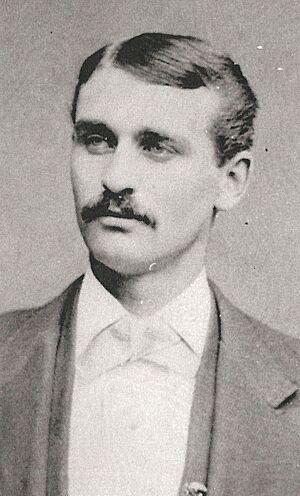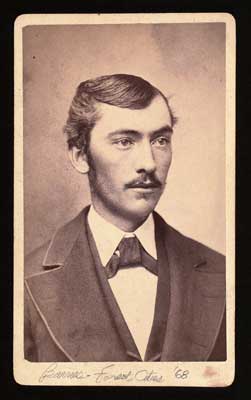Ross Barnes facts for kids
Quick facts for kids Ross Barnes |
|||
|---|---|---|---|
 |
|||
| Second baseman / Shortstop | |||
| Born: May 8, 1850 Mount Morris, New York, U.S. |
|||
| Died: February 5, 1915 (aged 64) Chicago, Illinois, U.S. |
|||
|
|||
| debut | |||
| May 5, 1871, for the Boston Red Stockings | |||
| Last appearance | |||
| September 21, 1881, for the Boston Red Stockings | |||
| MLB statistics | |||
| Batting average | .360 | ||
| Runs scored | 698 | ||
| Runs batted in | 346 | ||
| Teams | |||
|
|||
| Career highlights and awards | |||
|
|||
Charles Roscoe Barnes (born May 8, 1850 – died February 5, 1915) was a famous baseball player. He was one of the biggest stars in the early days of professional baseball. He played in the National Association (from 1871 to 1875) and the first years of the National League (from 1876 to 1881). Ross Barnes played second base and shortstop. He was a key player for the amazing Boston Red Stockings teams in the early 1870s. Even though his teams had many famous players, many people thought Ross was the most important player of all.
Contents
Early Life of Ross Barnes
Ross Barnes was born on May 8, 1850. His hometown was Mount Morris, New York, in Livingston County, New York.
Baseball Career Highlights
From 1868 to 1870, Ross Barnes was a star player for the Rockford Forest Citys team. He became a professional player in his second year with them. When the National Association was created in 1871, Harry Wright signed Ross and another player, Albert Spalding, to his new team in Boston. Ross Barnes started his major league career when he was 21 years old.
He played as both a second baseman and a shortstop for the Boston Red Stockings. In his first year, Barnes led the league with 66 runs scored. He also had 91 total bases and a very high batting average of .401.
In 1872, Ross Barnes was even better! He led the National Association in many ways:
- Batting average: .432
- Slugging percentage: .585
- Base hits: 99
- Total bases: 134
- Doubles: 28
The Red Stockings became a super strong team for four years, and Barnes was a huge reason why. In 1873, he led the league again with a .425 batting average. He also led in on-base percentage (.456), slugging percentage (.584), hits (137), runs scored (125), total bases (188), doubles (29), walks (28), and stolen bases (13).
His team, the Red Stockings, won an amazing 205 games and lost only 50 from 1872 to 1875. This winning record has not been beaten by any team since!
Moving to a New Team
Before the 1875 season ended, Ross Barnes and four other Boston players signed contracts with the Chicago White Stockings. When Boston fans found out, they were very upset. The National Association might have stopped the players from moving. But the Chicago team owner, William Hulbert, started a brand new league called the National League. This caused the old National Association to break up.
Barnes's new Chicago team finished first in the National League's first season in 1876. They had a great record of 55 wins and 12 losses. Ross Barnes was still a top player. He led the National League in many categories:
- Batting average: .429
- On-base percentage: .462
- Slugging percentage: .562
- Runs scored: 126
- Hits: 138
- Total bases: 190
- Doubles: 21
- Triples: 14
- Walks: 20
In 1876, Barnes also set a record for the most runs scored per game (1.91), which is still a record today. He also hit the very first home run in National League history on May 2, 1876. He scored 54 more runs than any other player that year, which is the biggest difference ever in Major League Baseball history!
The Fair-Foul Bunt Rule Change
Ross Barnes was famous for a special way of hitting called the "fair-foul bunt." He was so good at it that the National League changed its rules after the 1876 season to stop it.
Back then, home plate was made of cast iron and was placed further forward. If a batted ball landed first in fair territory, it was still considered fair even if it rolled into foul territory right away. Also, hitters could ask the pitcher to throw the ball high or low. Many players would ask for a low pitch and then bunt the ball so it landed fair but quickly rolled into foul territory. This made it very hard for the other team to get them out.
Barnes was a master of this trick. But he did it differently. He would take a full swing and aim for the top of the ball. This made the ball bounce off home plate and roll far into foul territory. When the players on the field would move closer to try and field his bunts, Barnes would sometimes swing hard instead, to keep them guessing. This special technique helped Barnes be a dominant hitter, often batting over .400.
However, once the rule was changed, Barnes's hitting numbers dropped a lot. He never hit above .300 again.
In 1877, Barnes became very sick with an illness. He only played 22 games and didn't play well. This sickness made him lose a lot of his strength and speed, which shortened his career. Some people thought the rule change hurt his career, but others believe his illness was the main reason he wasn't as good anymore.
Ross Barnes tried to get back to his old form for the rest of his career, but he never quite made it. He played for a minor league team in 1878, then for the Cincinnati team in 1879. He didn't play at all in 1880. He finished his professional career in 1881, playing his last season back in Boston, where he had been so famous. After 1876, his batting average was never better than .272. He retired from playing baseball at age 31.
He ended his career with 859 hits, 698 runs, and a .359 batting average. He played in only 499 games played and had 2392 at bats. His record of 1.4 runs per game played is still the best of all time.
Barnes came back to baseball for a short time in 1890. He worked as an umpire for the Players' League.
How Good Was Ross Barnes?
Ross Barnes is one of only four players in Major League Baseball history to lead his league in runs scored by more than 30 runs over the next closest player. In 1876, Barnes scored 54 more runs than the second-place player, George Wright. This is the biggest difference ever!
Barnes holds many records in the old National Association:
- Runs: 459
- Hits: 530
- Doubles: 99
- Walks: 55
- Stolen bases: 73
- Total bases: 695
- Times on base: 585
- Runs produced: 694
- Batting average: .390
- On-base percentage: .413
- Slugging percentage: .511
Many baseball experts in the late 1800s and early 1900s thought very highly of Barnes. In 1903, a sportswriter named Tim Murnane called Barnes the "king of second basemen" and the "finest batsman and run-getter of all time." However, as time went on, people started to forget about Barnes's amazing skills. Some experts, like Bill James, said his success was mostly because of the old rule that was changed.
But in the 21st century, some baseball writers have started to give Barnes more credit. In 2007, Nate Silver wrote that Barnes was "arguably the single most dominant player in Major League history."
Personal Life
After his baseball career, Ross Barnes had several office jobs in the Chicago area. He worked as an accountant for a gas company. For most of his life, Barnes was not married. He married Ellen Welsh in 1900. He passed away from heart disease in 1915.
See also
- List of Major League Baseball batting champions
- List of Major League Baseball annual runs scored leaders
- List of Major League Baseball annual doubles leaders
- List of Major League Baseball annual triples leaders
- List of Major League Baseball single-game hits leaders
 | Kyle Baker |
 | Joseph Yoakum |
 | Laura Wheeler Waring |
 | Henry Ossawa Tanner |


